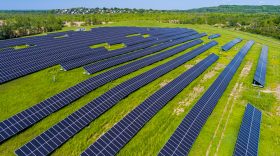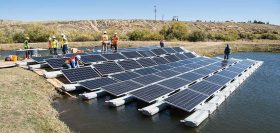Top 6 Solar Calculators: Starting Your Solar Journey Online
Rich Dana, November 11, 2015
There are plenty of “solar calculators” that offer to help you design your solar array, calculate size, output, cost, and savings. Some are quite helpful, and others can be outdated, inaccurate, or downright deceptive. How can you tell the difference between the helpful sites and the time-wasters? Solar Tribune has looked at loads of online solar panel calculators, and here is a list of our favorites.
Of all of the sites on the web, there are two that set the standard for all of the others. One, dsireusa.org, is the most complete guide to solar energy incentives and financing options, listed state-by-state. The other, pvwatts.nrel.gov, is the site that a lot of professional solar panel installers use to size systems and estimate annual production. These are the two best sites to start with, and then branch out into other sites for additional information. The great thing about both D.S.I.R.E. and PV Watts is that you can use them without having to create an account or share your personal information, like most of the online calculators due, because they are both funded by the Department of Energy, which makes them public and free to use. Most others require you to share some amount of personal info to use them.
D.S.I.R.E.
dsireusa.org
The Database of State Incentives for Renewables & Efficiency is a great place to start when exploring the financing options that are available to you. The search engine is absolutely great– just enter your zip code and it will spit out a list of every possible federal, state, county, local and utility company incentive that you may be eligible for. It also lists regulatory policies that may or may not have bearing on your particular situation. DSIRE is operated by the N.C. Clean Energy Technology Center at N.C. State University and is funded by the U.S. Department of Energy, and is kept about as current as anything could be in the fast-paced world of solar policy. Make sure that you check with your accountant or state department of revenue, IRS and local utilities though. You need to make sure all of the incentives are available before you invest.
PV Watts
pvwatts.nrel.gov
 Of all online calculators, “PVWatts” from the National Renewable Energy Laboratory (NREL) is probably the best, most accurate and easy to use. Around since the early 2000’s and now in its second, nicely updated iteration, the latest version of PVWatts is even better than the original. Accurate enough for professional analysis but easy enough to use for a novice, PV Watts will estimate your performance and payback based on your address, the orientation of your house, shading issues, local electric utility rates and more.
Of all online calculators, “PVWatts” from the National Renewable Energy Laboratory (NREL) is probably the best, most accurate and easy to use. Around since the early 2000’s and now in its second, nicely updated iteration, the latest version of PVWatts is even better than the original. Accurate enough for professional analysis but easy enough to use for a novice, PV Watts will estimate your performance and payback based on your address, the orientation of your house, shading issues, local electric utility rates and more.
There are a lot of nice, interactive features to the new PV Watts site that make it fun to use. You can do countless different scenarios, experimenting with different sized arrays, different racks and angles, and more. It will help you get a really good feel for how solar will perform at your site.
Solar IQ
http://solariq.io/
Solar IQ has one of the sleekest, most user-friendly interfaces of the online calculators out there. By just entering your zip code and average monthly electric bill, Solar IQ charts out price range you can expect to pay for your solar project. It includes information about incentives that can bring down your installed cost and shorten your payback period. Solar IQ helps to answers the questions:
- Does solar make financial sense for me?
- Should I lease or purchase my system?
- Am I getting a fair deal?
- Am I selecting a reputable contractor?
Solar-Estimate
/www.solar-estimate.org/
Solar Estimate estimate the size and cost of a solar power system, solar prices and the cost of a solar system after rebates. It will give you some basic info, but to get the full estimate, you need to enter your personal info– address, email and phone. A link to your full report is sent by email. It doesn’t give you much in the way of site information though, but the report does explain its assumptions well, so you can get a pretty good idea of how it applies to your particular site. The report also gives you a lot of good info on reducing system size through energy efficiency upgrades, etc.
Solar-Estimate tells you:
- What size solar system you need
- How much solar panels cost
- What rebates are available
- Your returns and payback period; and
- The best solar installers in your area
Solar Rating Online
http://solarrating.ca/index.php
You are asked to create an account for more info but the standard estimate is well organized with explanations in the help section, easy tools and easy to use graphic interfaces to measure orientation, roof slope, shadows/obstacles and more. It then generates a nice .pdf report with pretty accurate monthly production estimates. It is a nice, easy to use calculator, but honestly, it isn’t offering you anything that you can’t get from PV Watts, without sharing your personal info.
There are countless other solar energy calculators available for figuring our solar panel system size and cost. Most of them are at solar vendor sites, and although they can be great for comparing different brands and components, they can be misleading for a consumer, as the prices listed may be wholesale, or may not include shipping and handling prices. Don’t expect the prices of equipment on professional sites to correlate to what you will expect to pay- they may be deceptively lower or higher than your retail price, since panel prices are so fluid, listed prices may not be current.
Vendor Sites With Good Calculators:
http://www.affordable-solar.com/residential-solar-home/Residential-Calculator: Estimates solar power requirements to calculate the size and number of solar panel systems needed for solar system.
www.wholesalesolar.com/solar-information/start-here/offgrid-calculator https://www.altestore.com/store/calculators/off_grid_calculator/
Unlike most solar calculators, Wholesale Solar and AltE Store still cater to the off-grid market. They both have excellent calculators on their sites for planning an off-grid system.
Other Helpful Sites:
SolarPanelTalk.com: Largest solar forum for consumers to ask questions about solar in a non-sales environment
Solarreviews.com: Thr largest customer reviews website for the solar industry
SolarRating Online: Information collected from over 1000 weather stations worldwide to assess the suitability of your home for solar technologies: photovoltaic (PV) to generate electricity and solar thermal for heating domestic hot water.
Institute for Local Self-Reliance: Solar Parity Map: Illustrates the coming of cost-competitive solar based on a comparison of the unsubsidized cost of solar electricity with retail electricity prices of all 3,100 utilities in the U.S.
Clean Power Finance: National Permitting Database: Database of solar permitting requirements for cities and counties using an interactive, crowd-sourced platform that allows users of the database keep the information up-to-date and relevant
AEE: Advanced Energy Legislation Tracker: Information on energy legislation in all fifty states, which can be sorted by state, keyword, and policy area




